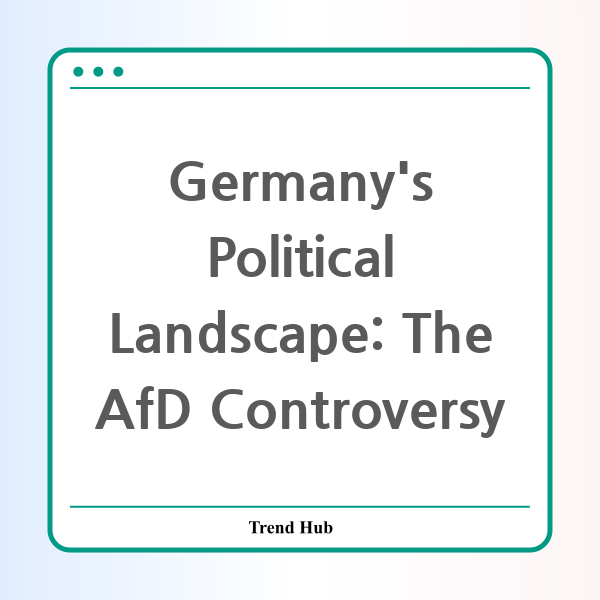* This website participates in the Amazon Affiliate Program and earns from qualifying purchases.

In a gripping political drama that has captured the attention of both domestic and international observers, Germany is grappling with the implications of classifying the Alternative für Deutschland (AfD) party as a right-wing extremist organization. This situation has raised critical questions about the nature of democracy, political freedoms, and the historical memory of the German state.
The classification was made by the Bundesamt für Verfassungsschutz (BfV), Germany's domestic intelligence agency, which argued that the AfD's ideology fundamentally undermines the country's commitment to a free democratic order. This decision follows the party's surprising electoral performance earlier this year, where it secured a stunning 20.8% of the vote, translating to 152 seats in the Bundestag, Germany’s parliament.
What are the consequences of this classification? In practical terms, it empowers law enforcement agencies to monitor the AfD's activities with increased scrutiny, allowing for methods such as phone tapping and employment of undercover agents. But the implications extend far beyond mere surveillance; this designation has ignited fierce political debates and accusations of censorship and authoritarianism.
U.S. Secretary of State Marco Rubio has been vocal in his criticism of Germany’s decision, claiming it reflects a form of 'tyranny in disguise.' He likened the current political atmosphere to the barriers that once divided East and West Berlin. This provocative comparison has resonated with some political followers but has also drawn sharp counterarguments from German officials.
The German Foreign Office responded to Rubio's comments directly on social media, underscoring that the classification was based on a thorough investigation into the AfD’s activities and ideology. They maintained that the decision was necessary, emphasizing that Germany’s historical lessons — particularly those drawn from the Nazi era — compel a vigilant stance against right-wing extremism.
As Europe faces a rising tide of far-right movements, the situation with the AfD is emblematic of larger societal trends. While some view the AfD’s emergence as a legitimate outcrop of populist sentiment, others see it as a potential threat to democratic values and social cohesion. Germany, still sensitive to its tumultuous past, must navigate these waters carefully, balancing civil liberties with national security.
The reaction from the AfD itself has been one of outrage, with party leaders claiming that the classification is not only a politically motivated attack but also a violation of democratic freedoms. They express fears that this could pave the way for further political persecution, pointing to the growing chorus around potentially banning the party altogether.
In the backdrop of this contentious climate, Germany is approaching the 80th anniversary of the end of World War II, a poignant reminder of the nation’s past and a context in which the present debate unfolds. Political leaders, including those from the Social Democrats (SPD), are weighing their options on how to respond to the growing influence of the AfD.
Looking ahead, the events surrounding the AfD could be a turning point in German politics. Whether this classification serves as a necessary tool for democracy or a step toward authoritarianism will depend on how deeply political factions and the public can engage in constructive dialogue, preserve civil rights, and ensure that history does not repeat itself.
* This website participates in the Amazon Affiliate Program and earns from qualifying purchases.